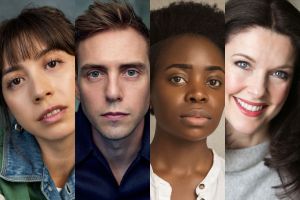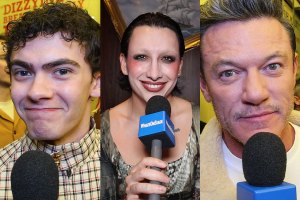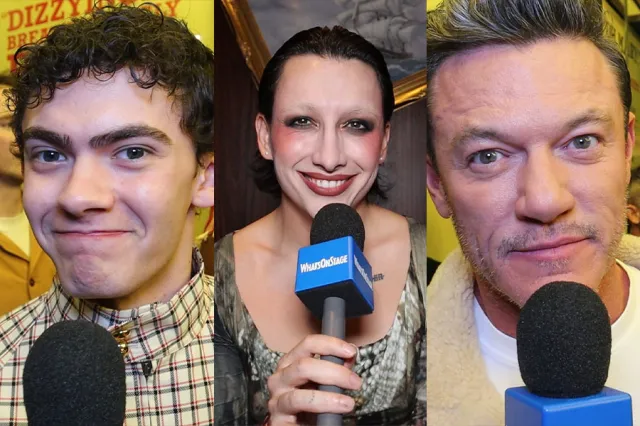20 Questions With…Adam Garcia
Australian actor Adam Garcia, currently appearing in Christopher Shinn’s Where Do We Live at the Royal Court, shares his concerns about the environment & recalls where he was on 11 September.
Adam Garcia made his West End debut eight years ago in the tap-dancing show from Down Under, Hot Shoe Shuffle. He went on to appear in Grease, Birdy and, most notably, Saturday Night Fever at the London Palladium.
In the last, a stage adaptation of the 1977 film with a classic BeeGees soundtrack, Garcia originated the role of Tony Manero, the Brooklyn boy and disco fiend immortalised by John Travolta on screen. He was nominated for a Laurence Olivier Award for Best Actor in a Musical.
Since then, Garcia has also attracted the attention of Hollywood, and scores of young female fans, with appearances in Coyote Ugly and Riding in Cars with Boys, starring Drew Barrymore. His upcoming film releases include The First $20 Million, Heart of Stone and Love’s Brother.
Despite his film success, Garcia still considers himself a stage actor first and foremost. He’s currently performing at the Royal Court Jerwood Theatre Upstairs in the premiere of Christopher Shinn’s Where Do We Live, about intolerance amongst a group of young New Yorkers before and after 11 September. The production continues its strictly limited season until 8 June 2002.
Date & place of birth
Born 1 June 1973 in Sydney, Australia.
Lives now in..
Camden, north London.
First big break
Being in Baz Luhrmann’s Dance Hall cabaret at the Sydney Festival in 1989. I stood on the steps and invited people in, but I also got to perform onstage. It was my first job dancing.
When did you move to the UK?
I moved here in March 1994 when the production I was in, Hot Shoe Shuffle, transferred. After our six-month run, I decided to stay, initially because I wanted to backpack around Europe and do that whole thing like all good Australians should. But then I got an agent and started getting auditions and it led to a career.
Career highlights to date
Hot Shoe Shuffle. Every time we opened was a highlight, especially the first time in Castle Hill in Sydney in 1992 and at the Queen’s Theatre in London in 1994. Also opening Saturday Night Fever at the London Palladium in 1998.
Favourite productions you’ve ever worked on
Hot Shoe Shuffle, Birdy (my first play, which was at the Comedy Theatre) and most probably Where Do We Live. There was a tremendous sense of family with each of them. I was with Hot Shoe Shuffle for two-and-a-half years with people who became some of my best friends. We stayed together, lived together, loved together. Same with Birdy, and the cast is also very close now on Where Do We Live. These things start out as jobs and turn into something really special. I feel proud to be involved.
Favourite co-stars
Drew Barrymore (from Riding in Cars with Boys) – I was a bit starstruck to be honest, it was trippy to even be working with her. Piper Perabo (from Coyote Ugly) is just a lovely and genuinely sincere person. Tom Williams and Corey Johnson (from Birdy), and all the cast of Hot Shoe Shuffle, my old tap-dancing friends.
Favourite directors
Kevin Knight (Birdy) and Richard Wilson (Where Do We Live). They actually pay attention to actors, which is strangely a rare thing, and they have patience. They make you feel that you are important, that you have something to say. And they’ve taught me what’s effective, what gets a piece across – how to focus on stillness, to concentrate and listen. Darren Aronofsky and Baz Luhrmann are two directors I’d love to work with too.
Favourite playwrights
Tennesee Williams, Arthur Miller, Tom Stoppard and Harold Pinter.
Which do you find more challenging – plays or musicals?
I like doing musicals, but plays are more challenging because I’m so inexperienced with them. It’s the time spent on a musical that’s annoying; you have to sign up for the best part of a year. With Saturday Night Fever, the challenge for me was to be able to lead a musical and I came through okay, but afterwards I wanted a break. Now that I’ve had one, I’d love to go back to musicals. They’re fun and relaxing because they’re so escapist, and it’s great to have an audience respond to that. It’s nice not to have to be really serious all the time.
What roles would you most like to play still?
Prince Hal in Henry IV, Ariel in The Tempest and Joe Gillis in Sunset Boulevard.
What was the last thing you saw on stage that you really enjoyed?
Jesus Hopped the ‘A’ Train here and the musical Batboy in New York. I’d love to see Batboy come to London. I like to call it and Urinetown (also in New York) the anti-musicals because they take all those things that people come to expect of the genre and turn them on their head. They are complete parodies but also quite engaging stories in and of themselves.
Why do you like to return to the stage?
I’m primarily a theatre actor. I’ve just been lucky enough to get into a few films and that’s good because films give you lots of exposure, so many opportunities and mucho dinero. But I much prefer theatre. It’s really an actors’ medium. You’re responsible for yourself on stage. And on film, directors have so many distractions. They’re worrying about cameras, lighting, time, money. You rarely get to rehearse, discuss or develop things so there’s not much attention to character and then you have no control over the editing. So I come back to the theatre to practice acting and I do films to rule the world.
What advice would you give the government to secure the future of British theatre?
More tax incentives for off-West End theatres and avant-garde companies like Theatre de Compliçité. In the West End, theatre is business and that’s fine, but theatre is art as well and it needs more funding and support.
If you hadn’t become an actor, what would you have done professionally?
I’d have been a scientific researcher, concentrating on environmental and ecological balance. When I was younger, I wanted to work for an Australian organisation called CSIRO (Commonwealth Scientific and Industrial Research Organisation). They’re very cutting edge, liberal and free-thinking – funded by the government but not controlled by it. I’ve always had a keen interest in environmentalism. How can we live on this planet and not fuck it up? We as humans like polluting because we like our luxuries. But it seems wrong to me the idea that this is considered ‘progress’ when we do it at the detriment of every other living thing and we do it with such apparent arrogance and impunity.
If you could swap places with one person (living or dead), who would it be?
David Attenborough, he’s my hero.
Favourite books
The Drowner by Robert Drewe and Fantastic Mr Fox by Roald Dahl.
Favourite holiday destination
Going home to my mum’s place in Sydney for eating, playing golf and surfing.
Why did you want to accept your part in Where Do We Live?
The character of Tyler (who leaves his more liberal boyfriend, played by Daniel Evans) didn’t appeal to me actually. He seemed to say the least on the page so that was a concern. But I’d wanted to work at the Royal Court and Richard Wilson was directing so I knew that’d be good and I liked the ideas in the play. It’s a beautiful, voyeuristic, keyhole look at people in situations where they’re either completely aware or unaware of their own intolerance. And I wanted to get back onstage and practice acting. This is only my third play. What I discovered was that Tyler is playable. Initially, he looks like an airhead but he’s not, he just doesn’t have the courage to speak up and he doesn’t want his friends to get hurt.
What’s your favourite line from Where Do We Live?
It got cut in rehearsals because it was repetitive, but it still says so much. “This always happens…the pathological person is validated while the person who is right is somehow made to be ridiculous.”
Where were you on 11 September?
I was in London, on the phone to a friend in Australia. We watched together in horror, just held the phone to our ears and didn’t speak for about an hour and a half. There was a somewhat cynical comment in one of our reviews for Where Do We Live, about how this was no doubt “the first in a long line of 11 September plays to come.” Well, yeah. That day changed our lives, so it’s only right that people will want and need to talk about it and that it should be documented in theatre. It won’t go away.
What are your plans for the future?
More theatre please. I’m doing another workshop in New York for a musical called Wicked. The plan is to play out of town for a couple of months and then aim for Broadway in the latter half of next year. I’ve never performed on Broadway so that would be very exciting and I love New York. But I’ve got no jobs confirmed for the future just yet so my gardening should get better.
– Adam Garcia was speaking to Terri Paddock
Where Do We Live continues at the Royal Court Jerwood Theatre Upstairs until 8 June 2002.












